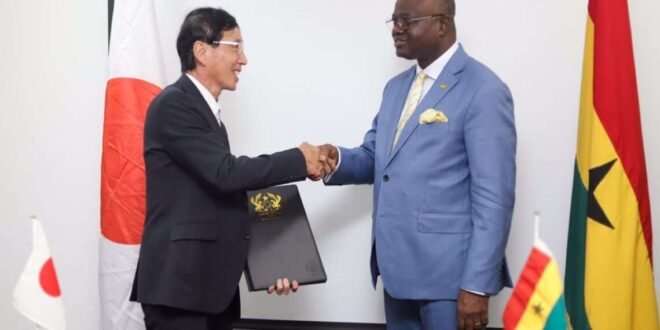Strengthening Bilateral Ties Through Education and Sustainability
Ghana and Japan have taken a significant step in enhancing their bilateral cooperation by signing a Memorandum of Understanding (MoU). This agreement focuses on strengthening collaboration in the field of education, with particular emphasis on digital skills and sustainability. The MoU was signed between Mr. Haruna Iddrisu, the Minister of Education of Ghana, and the Japanese Ministry of Education, Culture, Sports, Science and Technology (MEXT).
The initiative aims to promote inclusive and high-quality education, ensuring that Ghanaian youth are equipped with essential digital competencies necessary for sustainable development. The partnership is designed to enhance institutional capacity through various collaborative efforts, including teacher training, joint curriculum development, and the promotion of green skills within Technical and Vocational Education and Training (TVET) programs. These efforts are intended to prepare the youth for emerging sustainable industries.
Mr. Iddrisu expressed deep appreciation to the government of Japan and MEXT for their longstanding friendship, technical support, and shared vision for educational advancement. He emphasized that the collaboration goes beyond mere bilateral cooperation, embodying a shared belief in the transformative power of education. According to him, education is a key tool for building peaceful, resilient, and sustainable societies.
Ghana has drawn inspiration from Japan’s focus on community-based learning, environmental stewardship, and holistic student development. The country is eager to integrate these principles into its ongoing educational reforms. The Minister highlighted that the collaboration is strategic, timely, and transformative as Ghana implements its Education Strategic Plan (ESP 2018–2030) and works towards a knowledge-based economy.
Mr. Iddrisu reaffirmed Ghana’s commitment to the initiative, expressing confidence that the shared vision, mutual learning, and structured cooperation would lead to tangible outcomes. He acknowledged Japan’s global leadership in Education for Sustainable Development (ESD), citing the UNESCO ESD Centre in Okayama and Japan’s consistent hosting of World Conferences on ESD as examples of this leadership.
These efforts reflect Japan’s commitment to fostering knowledge, values, and behaviors essential for a just and sustainable society. The statement also noted that Ghana fully embraces ESD as a core pillar of its education transformation agenda. The country views education as a key driver for achieving the Sustainable Development Goals (SDGs), particularly SDG 4, which seeks to ensure inclusive and equitable quality education and promote lifelong learning opportunities for all.
The statement further highlighted Japan’s continued support through various initiatives, such as the Japan International Cooperation Agency (JICA), the Project for Improving the Quality of Primary Education through Teacher Development, and the Sakura Science Exchange Programme. These programs have had a positive impact on education in Ghana, contributing to the country’s broader educational goals.
Through this partnership, both nations aim to create a framework for sustained collaboration, ensuring that education remains at the forefront of efforts to build a more sustainable and equitable future. The MoU marks an important milestone in the relationship between Ghana and Japan, setting the stage for continued progress in education and sustainable development.
 Info Malang Raya Its All About World News
Info Malang Raya Its All About World News




